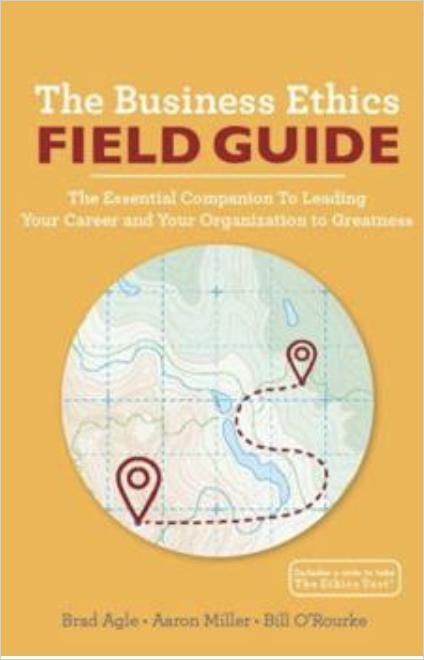Brigham Young University ethics professor Brad Agle, assistant professor Aaron Miller, and former Alcoa executive Bill O’Rourke detail how to function ethically in business.

Ethics in the Business World
Ethics professor Dr. Brad Agle, PhD, and assistant professor Aaron Miller, both of Brigham Young University, and Bill O’Rourke, a former Alcoa executive, explain how to navigate business ethics. They believe you could and should become a “moral manager,” and helping you achieve that goal is the purpose of their book.
People often believe that their – self-perceived – good intentions will lead them to make correct ethical choices, but the authors make it clear that learning to reach ethical decisions takes training and experience.
Ethical leaders understand the importance of being both a moral person and a moral manager.Brad Agle, Aaron Miller and Bill O’Rourke
Often, ethical dilemmas are nuanced and may pit one value against another. To resolve confusing conflicts, the authors teach, you must define your company’s values – and your own.
Truth to Power
Consider the problem of standing up to someone powerful, a typical dilemma at the beginning of most careers.
For example, say you’re a new CPA, and your boss, a senior CPA, asks you to remove a required fine from a client’s taxes. What should you do? You know your boss made a mistake on this tax return but doesn’t want to lose the client.
As you ask questions, don’t start by accusing your boss of unethical behavior.If the situation pits you against your boss, you can’t win. Instead of loudly resisting doing as asked, consider where you could turn to for help and guidance. Does your boss have the legal, contractual, or moral right to ask you to remove the fine? Do you have a mentor or other resource people with whom you could discuss this in confidence?Does your professional association have an advice line? Do your company’s values or policies, or your industry’s standards, offer any resources?
Talking to an HR representative or an ombudsman is an option, but anyone in such a capacity may have to create an official record, which could damage your boss’s career and lead to repercussions against you. When you reach out to others, don’t dramatize the situation. Gather any information that could help you make a thoughtful, ethical decision. You may have to go back to your boss, but that conversation will go better if you are well-prepared for any scenario.
Unethical Behavior
The authors acknowledge that making ethical decisions isn’t necessarily easy. Rationalization – or self-deception – can help you convince yourself that an unethical act is actually morally sound. You may recognize your self-deceit only when you examine your behavior in greater depth, as the authors advise, or when someone confronts you about it.
People deceive themselves by holding others responsible for their actions, finding fault with their critics, or believing everyone does the same thing they’ve done. Finding yourself defaulting to these excuses is a warning sign to examine your decision.
If you believe you are in control of your fate, you’re less likely to do something unethical than if you have an external locus of control and believe that others determine your actions. People often act unethically when they’re under financial pressure.
Agle, Miller, and O’Rourke report that external influences can affect how someone deals with ethical dilemmas. Normally, obeying authority is a good choice, until it becomes your top priority and blinds you to negative consequences or incorrect behavior on the part of your superiors. If you are in a problematic group situation and expect someone else to act, that’s the “bystander effect” in action For example, multiple people knew fraud was occurring at Enron, but only a few – the whistleblowers – took action.
Other ethical dangers include normalizing bad behavior. If you strongly identify with your geographic or demographic group, you might use “psychological distancing” as a reason to treat someone from another group differently.Knowing and observing potential barriers to unethical behavior helps, but it doesn’t inoculate you from unethical decisions unless you take the next step of applying your knowledge to your actions.
In any ethical dilemma, consider how your decisions may affect other people.Having a decision-making process in place can help you overcome your emotions when you face an ethical choice. Identify the relevant facts and ethical issues. Define which stakeholders your decision may affect. Review possible solutions within various ethical frameworks. When you reach a decision, talk with a trusted friend or mentor about what you have learned and how that knowledge might influence future decisions.
Whenever your actions or decisions impact others, you enter the ethics realm. Brad Agle, Aaron Miller and Bill O’Rourke
Ask clarifying questions about each issue. For example, how will your decision on this ethical concern impact others? Would you accept the decision if you were the party it affects? Is your decision fair? Does it align with your personal values and identity? Does it align with your company’s stated values? Does it align with the values your organization practices?
Dealing with an ethical situation is rarely a cut-and-dried matter. Applying a clear decision-making process will help clarify your thinking.
A “Moral Manager”
Even entry-level employees must make ethical decisions. Defining your values and examining your decisions may give you a reputation as a moral person, but you must do more to become a “moral leader.” Leaders must earn a reputation for publicly espousing and practicing sound ethics and for behaving in line with their pronouncements.
It is easier to face ethical challenges…when you’ve put in some work ahead of time. Brad Agle, Aaron Miller and Bill O’Rourke
As the authors emphasize, each individual must begin the ethical business journey by identifying and clarifying his or her values. Post a list of your values as a reminder and guide. Surround yourself with ethical people by choosing to work for an organization that adheres to your values. Consider a company’s mission statement and code of conduct and talk to insiders to learn if the company’s private actions are consistent with its public stance on ethics.
As a leader who wants to maintain good ethical practices in your organization, regularly measure your employees’ perceptions of your company’s ethics. Emphasize values and morality in meetings and memos. Offer ethics coaching and training. Base your bonus and incentive programs on the behavior you want to support. When interviewing job candidates, ask how they would handle an ethical dilemma. When an incident occurs that brings someone’s ethics into question, handle it on the basis of the company’s values – not monetary factors.
Agle, Miller, and O’Rourke urge you to reflect your organization’s ethics consistently in its rules, processes, incentive structures, and even the physical layout of your facilities. If you say being available to employees is important, don’t lock yourself away on the top floor.
Clarifying Values
Agle, Miller and O’Rourke never say: if this happens, do that. They recognize that remaining ethical in the business world is difficult and that most people lack the mental and moral preparation to deal with ethical dilemmas. The authors offer useful frameworks and examples of morally difficult situations if not all that much tactical guidance. Instead, they provide the tools for thoughtful strategizing. They explain how to establish your personal and professional moral compass, how to check yourself for ethical inconsistencies, and how to balance the demands of keeping a job and remaining ethical. They set out to spur clear thinking about the morality of the workplace – and in that, they succeed.












